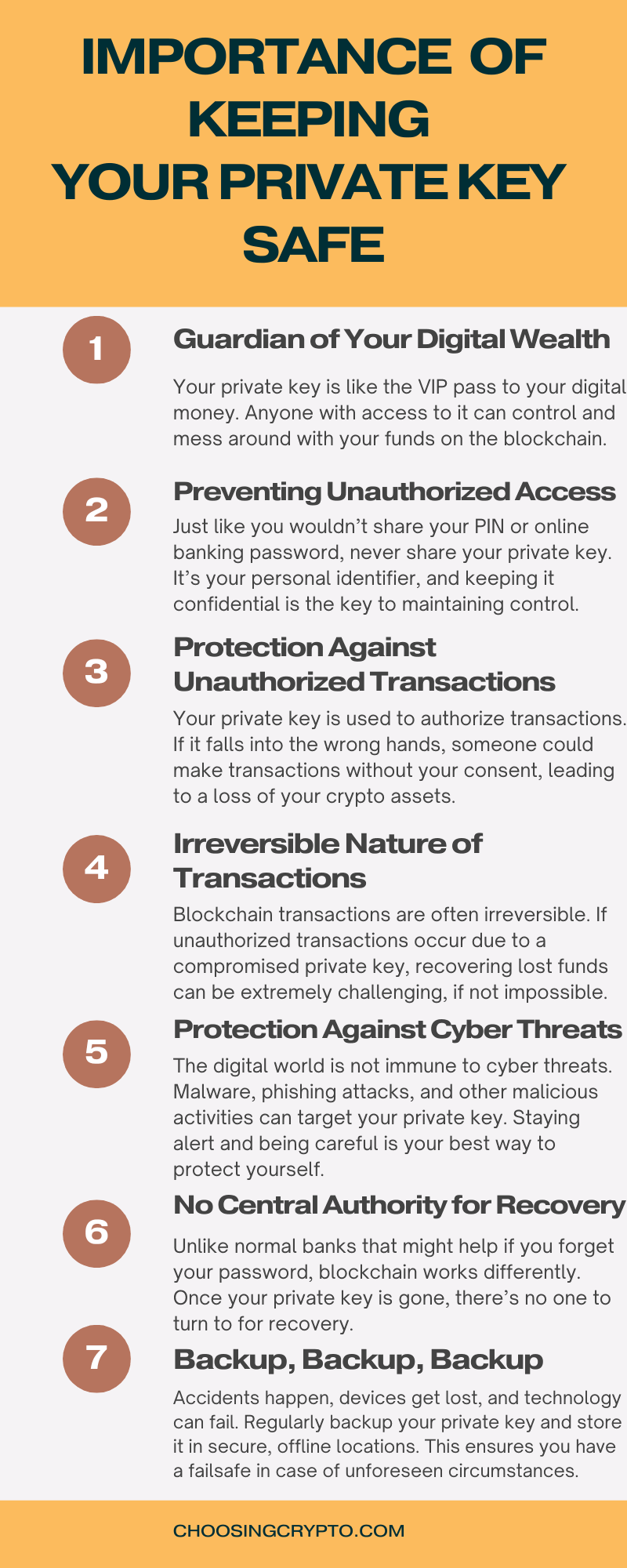If you’re into crypto, you might have heard about something called a “private key.” But what is a private key in blockchain, and why should it matter to you?
Well, let’s go into that together in this blog post!
By the time you finish reading, you’ll not only know what private keys are all about in blockchain but also realize why they’re super important for keeping your cryptocurrencies safe.
Understanding this will give you the confidence and clarity to navigate the crypto market like a pro.
Think of private keys as the unsung heroes of the blockchain universe – they hold a lot of power.
So, if you’re up for a journey of discovery and understanding, let’s get started – buckle up and come along with me!
IMPORTANT: I've selected some really great blog posts that I think you'll absolutely love. They're waiting for you right at the bottom of this post. Don't forget to give them a read!Understanding Blockchain Basics
Before we get into the nitty-gritty of private keys, let’s take a moment to understand the fundamentals of blockchain technology.
Picture a digital ledger, a sort of virtual notebook, where transactions are recorded securely and transparently, without the need for a central authority like a bank.
In simpler terms, think of blockchain as a chain of blocks, where each block contains a batch of transactions.
What makes blockchain unique is its decentralized nature.
Instead of relying on a single entity to verify and authorize transactions, blockchain transactions are validated by a network of computers, known as nodes, spread across the globe.
Imagine you’re sending cryptocurrency, say Bitcoin, to a friend. When you initiate this transaction, it’s broadcasted to the blockchain network.
Miners, special nodes equipped with powerful computers, compete to validate and add your transaction to a block.
Once confirmed, your transaction becomes a permanent part of the blockchain’s history.
Now, you might wonder, how does blockchain ensure the security and privacy of these transactions?
This is where private keys come into play, acting as the digital keys to your virtual vault.
What is a Private Key in Blockchain?
A private key is a unique, secret code that allows you, and only you, to access and control your cryptocurrencies on the blockchain. It’s like a secret password that unlocks your crypto.
Your private key is kept confidential and known only to you.
It’s the key that grants you access to your crypto assets and allows you to authorize transactions from your wallet.
Without your private key, no one can access or manipulate your funds.
Now, you might be wondering, how is this private key generated, and why is it so secure?
Private keys are typically generated using advanced cryptographic algorithms, ensuring their randomness and unpredictability.
They are incredibly secure due to their complexity and the sheer computational power required to crack them.
In essence, your private key is the ultimate guardian of your crypto wealth in the blockchain universe.
It’s essential to keep it safe and secure, much like you would guard your physical valuables.
How Private Keys Work
Now that we understand what a private key is, let’s go into how these digital protectors actually work in blockchain.
- Creating a Key Pair: When you set up a crypto wallet, it generates a pair of keys: the public key (your wallet address) and the private key (your secret access code). The magic lies in the fact that these keys are mathematically linked but virtually impossible to reverse-engineer. What happens on the blockchain stays on the blockchain!
- Public Key and Wallet Address: Your public key is shared openly on the blockchain. It’s like your account number – people can use it to send you cryptocurrencies. Think of it as giving someone your email address; they can send you messages, but they can’t access your inbox.
- Private Key and Authorization: Your private key, on the other hand, remains confidential, strictly for your eyes only. It’s stored securely in your digital wallet. When you want to send crypto or access your funds, your private key is used to digitally sign the transaction. It’s your personal stamp of approval.
- Encryption and Decryption: Private keys engage in encryption and decryption. When someone sends you crypto, they use your public key to encrypt the transaction. Only your private key, securely stored on your end, can decrypt and authorize the transaction.
- Secure Transactions: Since only the rightful owner possesses the private key, it ensures that transactions are secure and tamper-proof. Picture sealing an envelope with a unique wax stamp – only your stamp (private key) can open it, making sure the contents are untouched.
- Digital Signature: Your private key also generates a digital signature for each transaction. This signature, combined with your public key, provides proof of ownership and authenticity. It’s like having your unique signature on every digital check you write.
Importance of Keeping Your Private Key Safe
Now that we’ve unveiled the secrets of private keys, let’s talk about how crucial it is to keep them safe.
Picture your private key as the key to your digital kingdom – losing it or having it land in the wrong hands can lead to some serious problems.
Let’s dig into why looking after your private key is super important:
- Guardian of Your Digital Wealth: Your private key is like the VIP pass to your digital money. Anyone with access to it can control and mess around with your funds on the blockchain.
- Preventing Unauthorized Access: Just like you wouldn’t share your PIN or online banking password, never share your private key. It’s your personal identifier, and keeping it confidential is the key to maintaining control.
- Protection Against Unauthorized Transactions: Your private key is used to authorize transactions. If it falls into the wrong hands, someone could make transactions without your consent, leading to a loss of your crypto assets.
- Irreversible Nature of Transactions: Blockchain transactions are often irreversible. If unauthorized transactions occur due to a compromised private key, recovering lost funds can be extremely challenging, if not impossible.
- Protection Against Cyber Threats: The digital world is not immune to cyber threats. Malware, phishing attacks, and other malicious activities can target your private key. Staying alert and being careful is your best way to protect yourself.
- No Central Authority for Recovery: Unlike normal banks that might help if you forget your password, blockchain works differently. Once your private key is gone, there’s no one to turn to for recovery.
- Backup, Backup, Backup: Accidents happen, devices get lost, and technology can fail. Regularly backup your private key and store it in secure, offline locations. This ensures you have a failsafe in case of unforeseen circumstances.

Common Misconceptions Surrounding Private Keys
Let’s clear up some common misconceptions about private keys and blockchain security so that you can cruise through them with confidence.
- Myth: Private Keys and Public Keys Are Interchangeable:
- Reality: While they are linked, private and public keys do different jobs. Your public key is shared openly, allowing others to send you funds, while your private key is kept confidential and is solely for your use.
- Myth: Private Keys Can Be Easily Recovered:
- Reality: Once your private key is lost, it’s a real challenge to get it back. Blockchain doesn’t have a central helper to recover lost keys. It’s vital to have secure backup plans.
- Myth: Private Keys Can Be Shared Safely:
- Reality: Think of your private key as your PIN number – super secret! If you give it to someone else, they can do whatever they want with your money. Keep it to yourself, even if you trust the person.
- Myth: Private Keys Can Be Changed:
- Reality: Your private key is generated when you create your wallet and remains constant. Changing it is not possible. If compromised, the best course of action is to transfer your funds to a new wallet with a new private key.
- Myth: Quantum Computers Can Easily Break Private Keys:
- Reality: While quantum computers are super smart, they’re not quite there yet for breaking blockchain codes. However, scientists are working on developing quantum-resistant algorithms.
- Myth: Private Keys Are Stored on the Blockchain:
- Reality: Private keys are not stored on the blockchain; rather, they’re stored in your crypto wallet. The blockchain contains a record of transactions, with the public key acting as an identifier.
Read Also: 7 Misconceptions about Bitcoin
Lost Private Keys and Recovery
Losing your private key in blockchain can be like losing the key to a treasure chest.
Imagine having a vault filled with goodies, and suddenly you can’t find the key to open it.
Here’s what you need to know about lost private keys and what you can do about them:
- Irreversible Nature: Once a private key is lost, it’s usually gone for good. Blockchain transactions are set up to be irreversible, which makes things super secure but also means that once a key is lost, it’s tough luck.
- No Central Authority: In blockchain, there’s no central office you can call for help. Everything works on decentralization, which means there’s no customer support hotline or reset button for lost keys. You’re on your own, unfortunately.
- Backup Strategies: Prevention is the name of the game. Before disaster hits, it’s important to have solid backup plans for your private keys. This could mean storing them securely offline, making multiple copies, or using hardware wallets with recovery phrases.
- Recovery Options: Many wallet providers offer ways to recover your lost key, like seed phrases or mnemonic phrases. These are like secret codes that can help you regenerate your key and get back to your funds.
- Wallet Migration: If you suspect your private key is compromised, you might need to move your funds to a new wallet with a fresh private key. This helps keep your crypto assets safe from prying eyes.
- Learning from Mistakes: Losing your key can be an expensive lesson. Use it as a chance to remind yourself and others in the blockchain world about the importance of keeping keys safe and sound.
- Future Preparedness: Moving forward, prioritize proactive measures to safeguard your private keys. Stay informed about emerging security practices and technologies to mitigate the risk of future losses.
Additional Resources:
Excited to learn more about Bitcoin and cryptocurrencies? We’ve got some awesome resources below to help you out.
- 7 Best Ways to Secure Your Cryptocurrencies
- Most Common Mistakes Crypto Investors and Traders Make
- 7 Best Practices for Crypto Wallet Security
- How to Backup Your Crypto Wallet
- Most Common Crypto Scams and How to Avoid Them
And guess what? We’re also on Instagram and Twitter(X). Join us there for even more fun and useful content!

DISCLAIMER:
The information provided here is intended for informational purposes only and should not be solely relied upon for making investment decisions. It does not constitute financial, tax, legal, or accounting advice. Additionally, I strongly recommend that you only invest in cryptocurrency an amount you are comfortable with potentially losing temporarily.
Read Also: 5 Best Cryptocurrency Mobile Wallets
